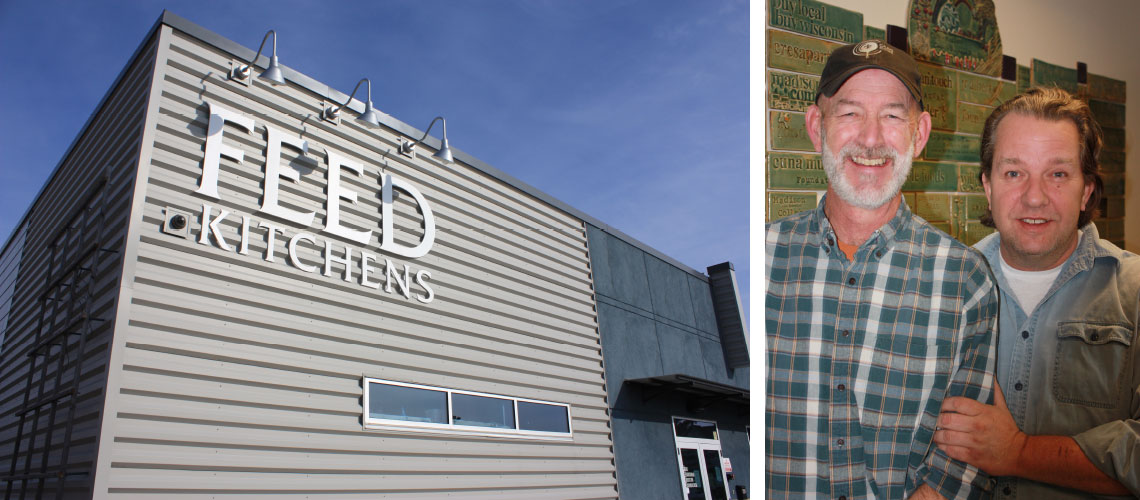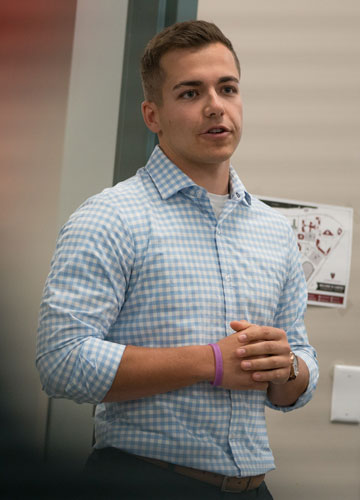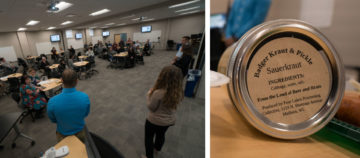Badger Kraut & Pickle
Message From the President
Experiential Leadership: Building a Two Bit Circus
When it comes to connecting learning, beliefs, and action, Holly Klawitter, MBA Programs Coordinator and Lecturer in the School of Business, sees real-life practical examples of that lofty goal every day.
“It’s my absolute favorite thing to teach,” Klawitter says. “It really gives students the opportunity to apply the things they’ve learned in a real-world scenario.”
She’s talking about BUS 499, a School of Business ‘capstone’ course, which, as a COR 3 class, asks students to consider “what is my role in building a more just and compassionate world?”
The students – juniors and seniors – take on a live service case, where they’re assigned to work with organizations in the Greater Madison area. Those organizations – mostly non-profits – submit a proposal to Klawitter with a problem or challenge they’re currently facing. The student teams function as consultants over a four- to six-week period, trying to solve whatever problem – or business need – is presented.
The students break into teams assigned by Klawitter, so they’re multi-functional: some are studying Accounting, or Finance, or Marketing, for example. Near the end of the semester, the team presents, or “pitches,” the organization with the plan they’ve developed.
“I see the most growth from students during this project as well,” Klawitter says. “They get excited to see these ideas come to fruition and that these are businesses that are really using their ideas.”
A recent idea – and an especially tasty one – is for Badger Kraut & Pickle.
The idea: a Wisconsin-branded sauerkraut.

Right: Joe Mingle (r.) with Chris Brockel, Coordinator at Healthy Food For All.
Badger Kraut & Pickle, sauerkraut made from cabbage grown right here in Wisconsin, was the brainchild of Joe Mingle, a self-described ‘urban farmer’ and community activist. Mingle serves as volunteer coordinator at FEED Kitchens in Madison.
FEED Kitchens is a non-profit organization that serves as a revenue stream for Healthy Food For All, a community-based food recovery effort. ‘Healthy Food’ collects excess produce from farms and prepared foods from corporate cafeterias that would otherwise go to waste. The organization repackages this food and then distributes it to food pantries and neighborhoods all over Madison.
FEED also serves as an ‘incubator’ of sorts, for enterprising people who are trying to launch local products. Mingle says they provide commercial kitchen facilities for these local food entrepreneurs, many of whom are lower-income people seeking new careers, and older, second- and third-career adults trying to launch new products. Products like a sauerkraut made here in Wisconsin.
“Any team from Edgewood College that assists any one of these or any others that are in development is having a material impact in two ways,” Mingle says. “One, on the people they help, and two, helping build the local food infrastructure.” Prior classes have helped with pricing structures and some business plan fundamentals for products produced through FEED Kitchens.
In the case of the sauerkraut, students assigned to the ‘case’ developed a complete business plan, including market research, pricing at retail and wholesale, and variations in scaling and production. The plan includes proposed partnerships, including with the Madison Mallards baseball team – a ‘natural,’ says Mingle.
 One of those students was Alex Meister ’18. “One thing that stands out is that we were able to link what we were doing in the classroom with the community,” Meister says. “That was a great experience.”
One of those students was Alex Meister ’18. “One thing that stands out is that we were able to link what we were doing in the classroom with the community,” Meister says. “That was a great experience.”
Meister says the opportunity to present the team’s plans at the end of the semester had a special impact.
“It’s one thing to read within the covers of a text book,” Meister says. “But when you can really relate that to what’s going on (in the world), you can recognize how important the classroom learning really is.”
“With the overall mission of Badger Kraut & Pickle, it hit our heads for sure, but our hearts as well,” he says. “You see how passionate the people are, and how much pride they have in their work. We saw that in our group, how much impact FEED Kitchens can have, and what Badger Kraut & Pickle can do to support that.”

The team, after the successful presentation, took their work in the classroom to the School of Business Innovation Showcase, a contest where groups ‘pitch’ their business ideas to a group of judges, who this year included Craig Culver. Badger Kraut & Pickle won the showcase.
“I think some students may be conflicted between the values that the institution upholds, and being ‘cutthroat capitalist business people,’” Mingle says. “This presents an opportunity to feel o.k. about pursuing this field because social enterprises and other types of businesses are aligned with the mission of Edgewood College. It’s really about them, and how does it make them feel about what they’re doing.”
Klawitter agrees. “It fits so well with our values,” she says. “I’m excited about the COR program – it really sets us apart in being able to offer that richness for students, to allow them to think about their place in the world.”


